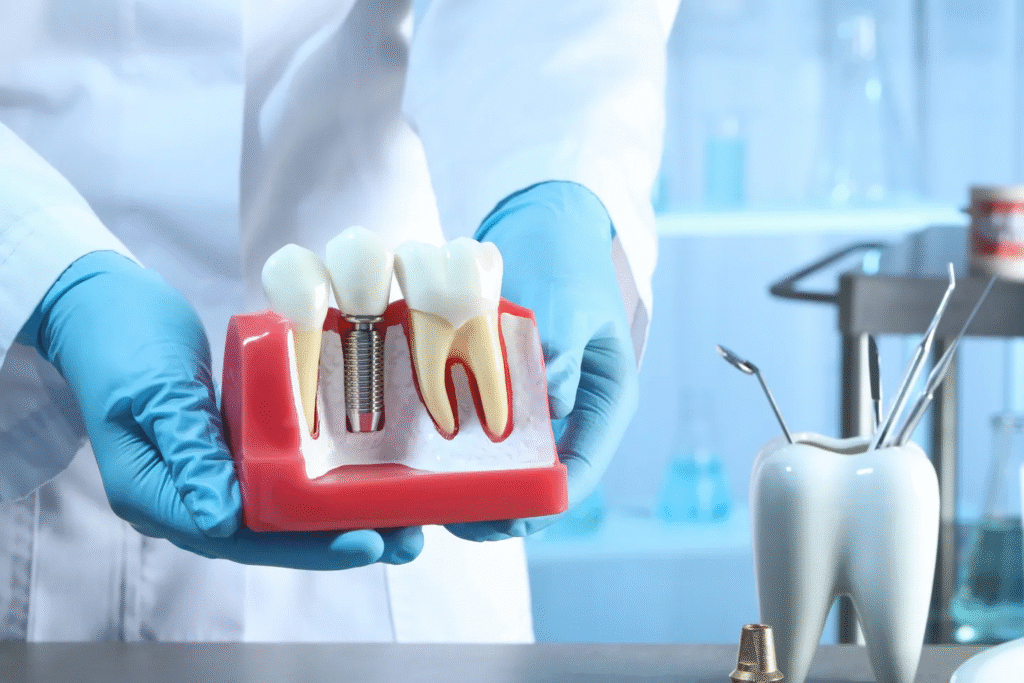Who Can Get Dental Implants?
Determining dental implant eligibility involves several factors, including oral health, bone density, and overall medical conditions. If you have one or more missing teeth and are wondering, “Am I a candidate for dental implants?”, it is best to schedule a dental implant consultation. Patients who have adequate bone support and healthy gums are often ideal dental implant candidates. However, even if bone loss is present, additional procedures such as bone grafting may be an option.
An Overview of Dental Implants
According to the American Academy of Implant Dentistry, more than three million Americans have dental implants, and the number continually grows by approximately 500,000 each year. Dental implants are small titanium posts placed into the jawbone to serve as the root of a replacement tooth. The titanium posts are later topped with a replacement tooth or teeth, usually in the form of a crown, bridge, or denture.
Individuals with missing or severely damaged teeth can achieve a more attractive smile and restore their oral health and function through dental implants. In some cases, root canal treatment may be a viable option to save a damaged tooth before considering extraction and implants. Unlike dentures, there are no messy gluing and cleaning procedures, and they do not need to be removed at night. Implants most closely resemble the function of natural teeth and offer benefits such as improved speech, enhanced chewing ability, and long-term durability.
Possible Dental Implant Options
According to the American Dental Association, implants are one of the biggest advances in dentistry in the past four decades. Along with restoring functionality and completing a set of teeth, dental implants can also help restore the appearance of a natural smile. They are a versatile treatment option that address a variety of situations, including:
- Severely Damaged Teeth: When a damaged or infected tooth cannot be saved with crowns or other restorations, removal and implant replacement can protect oral and overall health.
- One Missing Tooth: Ideal for single-tooth replacement. A crown is attached to the implant post for a natural look, and advancements in laser dentistry can promote faster healing and reduced discomfort.
- Multiple Missing Teeth: For sections of two or more missing teeth, implants can support a bridge. Full-arch replacement may involve a full denture anchored by implants in the jaw.
Dental Implant Evaluation: Signs That a Dentist Looks For
During the dental implant consultation, the dentist conducts a thorough oral examination and orders X-rays to determine candidacy. Key factors include:
Gum Health
Healthy, strong gums are essential for implant support. Periodontal disease or gum recession may require treatment before implant placement.
Bone Density Requirements for Dental Implants
Adequate jawbone density is critical for stable implant integration. Patients with insufficient bone may need bone grafting to enhance jaw strength prior to surgery.
General Health Conditions Affecting Dental Implant Eligibility
Certain medical conditions—such as uncontrolled diabetes, autoimmune disorders, or severe osteoporosis—can impact healing. Smoking increases implant failure risk but does not automatically disqualify a patient.
The Dental Implant Procedure
A dental implant procedure can take several months, as it involves multiple stages with healing time in between. These steps include:
- Initial Consultation: Evaluation of implant candidacy through examination and imaging.
- Bone Grafting (If Needed): Enhancing jawbone volume when natural density is insufficient.
- Surgical Placement: Insertion of the titanium post into the jawbone.
- Healing & Osseointegration: Bone fuses to the implant over several months.
- Placement of Abutment & Crown: Attaching the connector and final restoration to complete the process.
Dental Implant Cost and Affordability
One of the most common concerns patients have is the cost of dental implants. While implants have a higher initial cost compared to other options, their long-term durability and benefits make them a worthwhile investment. Patients seeking affordable dental implants in Safford, AZ should consult with our specialists to explore financing and payment plan options.
FAQs About Dental Implant Candidate
Q. What makes a good candidate for dental implants?
A good candidate for dental implants has healthy gums, sufficient bone density, and no major health conditions that may affect healing.
Q. What are the age requirements for dental implants?
While there is no strict age limit, implant candidacy generally requires fully developed jawbones, typically achieved around age 18 or older.
Q. What are the benefits of dental implants?
The benefits of dental implants include improved chewing ability, natural appearance, long-term durability, and jawbone preservation.
Q. Who is the best dental implant dentist in Safford, AZ?
At Desert Bloom Dentistry, we take pride in being among the best implant providers in Safford, AZ, offering expert care and customized treatment plans.
